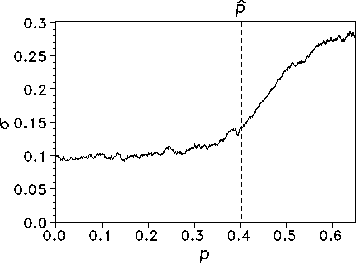In order to study the impacts of fragmentation on the abundance of different
species in Daisyworld we keep S'=1 fixed (implying ![]() ) and
calculate the rms-deviation
) and
calculate the rms-deviation ![]() of B(A) as a function of the patchiness
parameter p. The result is shown in Fig. 13. We observe that biodiversity
remains almost constant for
of B(A) as a function of the patchiness
parameter p. The result is shown in Fig. 13. We observe that biodiversity
remains almost constant for ![]() , i.e., as long as the growth space
remains connected. Beyond
, i.e., as long as the growth space
remains connected. Beyond ![]() , however, the species diversity becomes
a monotonously increasing function of fragmentation! This finding is in marked
contrast to the results presented in Sub-Section 4.2, where we stated that
biodiversity decreases as a consequence of environmental
deterioration.
, however, the species diversity becomes
a monotonously increasing function of fragmentation! This finding is in marked
contrast to the results presented in Sub-Section 4.2, where we stated that
biodiversity decreases as a consequence of environmental
deterioration.

Figure 13: Growth of biodiversity, expressed by rms-deviation ![]() of species spectrum B(A), with increasing fragmentation parameter p. S'=1, i.e.,
of species spectrum B(A), with increasing fragmentation parameter p. S'=1, i.e., ![]() .
.
Our observation can be explained as follows: within a homogeneous landscape, biodiversity is limited exclusively through competition. Only species with an albedo in the vicinity of the optimal value enjoy a sufficiently large growth rate for survival. And we have shown above that the ``window of fitness'' is shrinking with increasing irradiation.
In the case of habitat fragmentation, the process of Darwinian competition becomes more and more hampered. The growth space is split up into disconnected ``ecological niches'' at all scales, where even species with far-from-optimum properties can subsist. As the relative number of niches grows with p, the biodiversity grows as well.
Yet there is a price to be paid for biodiversity: the overall adaptive capability of the system dramatically decays due to the suppression of the selection process. So Daisyworld becomes more vulnerable to Global Change the more it becomes egalitarian -- biodiversity is harmful from the planetary point of view here!